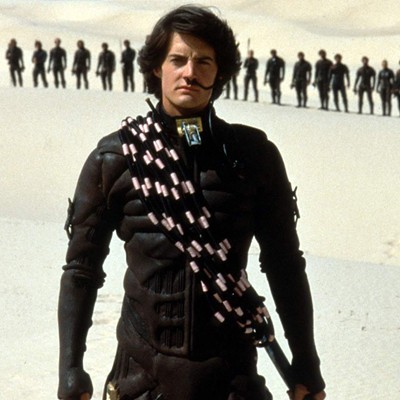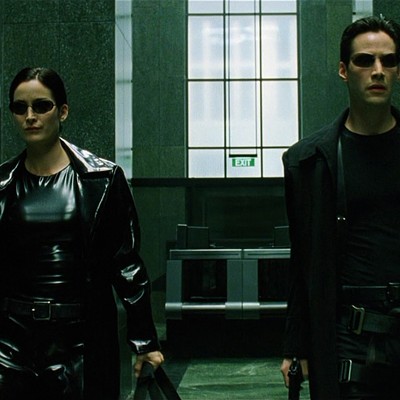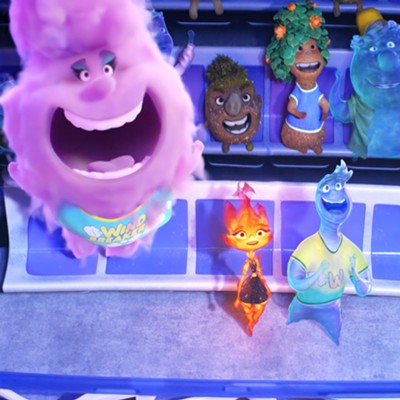It's often said the devil is in the details. That's literally the case when it comes to The Exorcist.
On Oct. 6, fan-favorite horror factory Blumhouse will release writer/director David Gordon Green's The Exorcist: Believer, which is meant to serve as a direct sequel to 1973's original The Exorcist film and be the first entry in a planned trilogy for the demonic horror franchise.
But here's the thing... there already were Exorcist sequels.
This follows Green's previous attempt at revivifying the Halloween franchise, which kicked off with a similar revisionary sequel (or "requel" in the modern parlance) in 2018 and spawned a divisive trilogy. The expectation is to do the same for the new Exorcist pictures.
Going back to franchise roots while ignoring subsequent entries is a fairly recent phenomenon, and one which takes extreme creative assumptions as to what audiences have or have not responded to. That Green and frequent collaborator Danny McBride (The Righteous Gemstones) thought they were up to the task of picking up the mantle from the likes of Halloween's John Carpenter and recently deceased Exorcist director William Friedkin showcases real chutzpah. Whether or not they nail the assignment with this new Exorcist trilogy remains to be seen.
Friedkin's original Exorcist was an almost-unparalleled sensation upon its release. It existed in a liminal space between the grit and neorealism of New Hollywood and the nascent blockbuster boom of the '70s. It scandalized viewers and critics alike, prompting sold-out showings and lines around the block. It eventually grossed over $400 million in 1973 alone (adjusted for inflation, it is the highest-grossing film for Warner Bros. Studios). Hearsay and superstitions about the production persist to this day, but money is king... or to borrow the dogma of The Exorcist, money is God. Attempts to recapture the (black) magic of that seminal and controversial film were inevitable.
A misbegotten sequel (Exorcist II: The Heretic) ensued in 1977. While it made money, the second installment stands as one of the most reviled sequels ever. A whopping 23 years later in 1990, author and original Exorcist screenwriter William Peter Blatty wrote and directed the underrated supernatural serial killer mystery The Exorcist III. Based on his novel Legion, it is a follow-up with loosey-goosey connections to the first film. (It also contains what is most likely the best jump scare in horror movie history AND a fleeting glimpse of Fabio.)
Hollywood then tried the prequel path. First there was 2004's Exorcist: The Beginning and 2005's Dominion: Prequel to the Exorcist, two intertwined films that had such tortuous productions, they'd be worthy of an entire article unto themselves. Most recently, there was a pretty compelling 2016 Fox television series simply titled The Exorcist, which did away with any acknowledgement of the sequels and prequels, well before Mr. Gordon Green.
Shortly after the release of the last Exorcist film was when the Hollywood requel-ization really took flight, with 2006's Superman Returns, an attempted rehab of the Man of Steel that canonized the first two Superman films by Richard Donner and Richard Lester, while ignoring Superman III and IV.
Green and McBride boldly took that baton and ran with it years later. Despite being a franchise with its own complex history of resets and contradictions, they had the audacity to reintroduce the Halloween franchise to a new generation of moviegoers. Their pitch: a direct sequel to the 1978 original bringing back Jamie Lee Curtis as the ultimate "Final Girl," this time as PTSD-riddled badass (nevermind that this had already been done in 1998's Halloween: H20). The hubris is evident almost from the start: The credits not only replicate the onscreen font and score of Carpenter, but literally show a rotting pumpkin rejuvenating itself — a crass metaphor for their intentions as well as a callback to the initial film's iconic opening.
There are other visual references: Laurie suddenly appearing out of nowhere outside a classroom (instead of Michael Myers) and Michael seen from an upstairs window standing ominously beneath a windblown clothesline. Frankly, these are shameless riffs on a stone cold classic. The follow-ups Halloween Kills (2021) and Halloween Ends (2022) recycled ideas from previous Halloween movies and introduced some confounding new ones, like the bizarre psychic link between Michael and upstart slasher Corey Cunningham. Both sit at sub-50% on the Rotten Tomatoes, which does not exactly bode well for the team's takeover of the Exorcist brand.
Green and McBride's pending Exorcist trilogy looks like it'll liberally borrow from the same playbook they used with Halloween: Rinse, repeat. Nothing apart from Friedkin's original film remains canon. They've brought back star Ellen Burstyn, who played the bereaved movie maven and mother to the possessed Reagan (Linda Blair). Their other main conceit appears to be bringing Burstyn into the room as an exorcism is performed, whereas in the Friedkin original, she was never present for any of the rituals.
Green has had a strange career — he started as an indie circuit darling before shifting in the mid-aughts to lensing raunchy comedies like Pineapple Express and The Sitter. With box office clout behind him, he decided to try his hand at horror, opting to delve into the most sacred cinematic wells the genre has to offer. Whether The Exorcist: Believer satisfies audiences and critics remains to be seen, but even if the new film is more hellish than a devilishly good time, at least 2023 exorcism moviemaking brought us the hilarious image of Russell Crowe riding a moped wearing Ferrari socks in The Pope's Exorcist. Hail Satan for that. ♦
The Exorcist: Believer opens in theaters on Oct. 5.






















